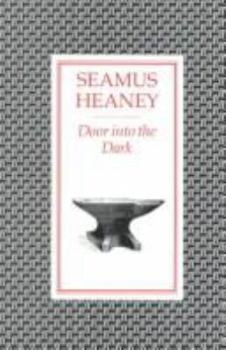Door Into the Dark: Poems
Select Format
Select Condition 
Book Overview
Door into the Dark, Heaney's second collection of poems, first appeared in 1969. Already his widely celebrated gifts of precision, thoughtfulness, and musicality were everywhere apparent. This description may be from another edition of this product.
Format:Paperback
Language:English
ISBN:0571101267
ISBN13:9780571101269
Release Date:January 1972
Publisher:Faber & Faber
Length:56 Pages
Weight:0.50 lbs.
Dimensions:0.2" x 5.0" x 7.8"
Related Subjects
PoetryCustomer Reviews
1 rating
Seamus Heaney's Door into the Dark
Published by Thriftbooks.com User , 24 years ago
Seamus Heaney's collection of poems entitled Door into the Dark was originally published in 1969. Heaney is a Nobel laureate and it shows in this volume of poetry. Many of these poems focus on Heaney's native country of Ireland, the landscape, the rural people, the bloodshed. Sometimes Heaney takes you off the face of the planet and into a new realm. In the poem "The Penninsula," he gives the reader a sense of being on a narrow, tenuous stretch of land that seems uninhabited by humans: The sky is tall as over a runway,/ The land without marks so you will not arrive/But pass through, though always skirting landfall./ At dusk, horizons drink down sea and hill,/ The ploughed field swallows the whitewashed gable/ And you're in the dark again. Many of the poems in this volume focus on rural people and the work they do, including a thatcher and a farm wife. As in other work of his, Heaney uses onomatopoeia with energy and exactness. He often forgoes traditional rhyme, but uses internal rhyme which contributes to the rhythm of the poem. Here are lines from "Thatcher" to illustrate my point: "He eyed the old rigging, poked at the eaves,/ Opened and handled sheaves of lashed wheat-straw." One of the fiercest poems in the collection is "Requiem for the Croppies." An Oxford English Dictionary is an important resource. I discovered that Croppies were Irish rebels who, in 1798, cropped their hair very short to show their alliance with the French Revolution. The sonnet seems to be a favorite form of Heaney; he uses it to describe the slaughter of the Irish rebels by English forces: ...on Vinegar Hill, the fatal conclave./ Terraced thousands died, shaking scythes at canon./ The hillside blushed, soaked in our broken wave./ They buried us without shroud or coffin/ And in August the barley grew up out of the grave. I recommend keeping a dictionary nearby when you read any poetry and certainly when you read Heaney's work. You may want to look up words such as couchant, thatcher, tarn, and bespoke. A reader of poetry knows that every word of every poem is essential in appreciating and understanding the total meaning. Heaney's poetry is intense, challenging, and definitely worthwhile. I recommend any/all of his books.





